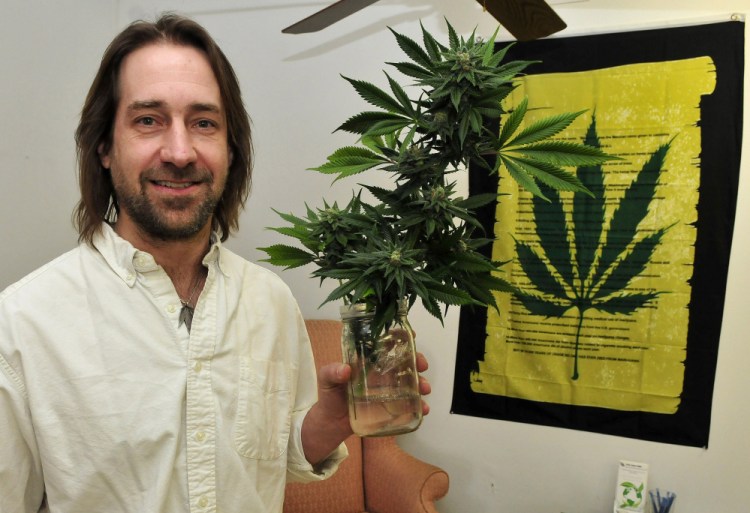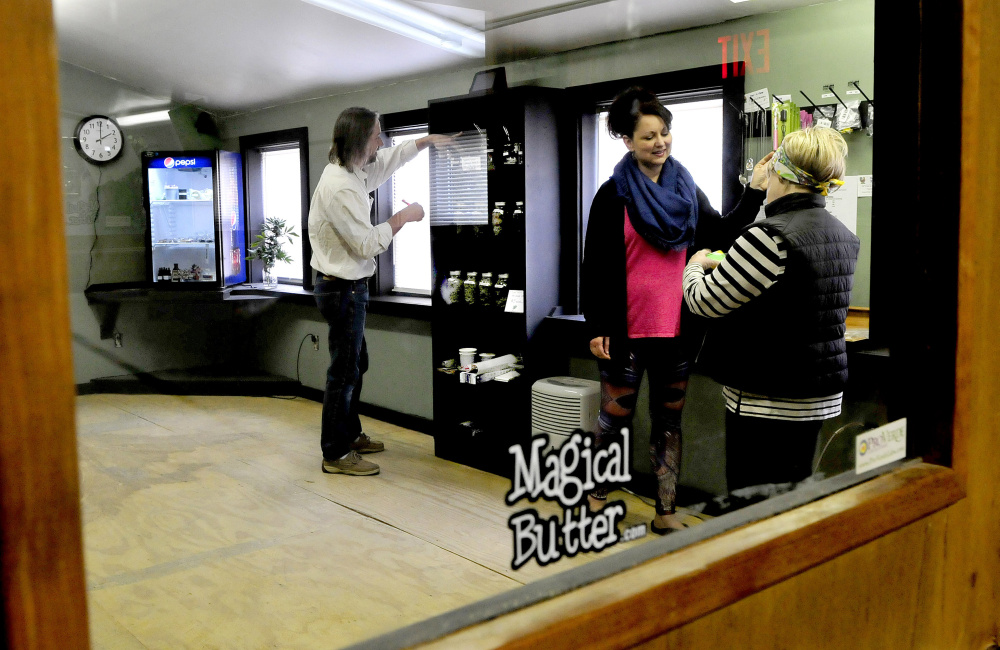City officials in Waterville are struggling with finding wording for an ordinance that would restrict medical marijuana businesses downtown, using the city’s adult business ordinance as a model.
In nearby Fairfield, town officials say their hands are tied by state regulations after neighbors of a medical marijuana caregiver complained and asked for restrictions.
At least one community in the state, York, is being sued by caregivers who say the town’s rules violate their legal rights.
As an increasing number of medical marijuana caregivers set up in central Maine communities, sometimes in industrial buildings or in densely populated neighborhoods, alarmed residents and municipal officials are trying to find out how they can be regulated.
State law, however, is complicating attempts to use local zoning rules or other regulations to police such operations, and some municipal officials are hesitant about overstepping their authority.
“This is all brand new,” Waterville City Attorney Bill Lee said. “It’s not necessarily that easy to draw a line between what the state says the municipality can or cannot do.”
Caregivers are allowed to grow up to six mature plants for five patients who designate them as such.
“The issue with the caregivers is that for 12 years they were home occupations. They were doing it out of their residences,” said Lynn Williams, an attorney representing the York caregivers. “But now, there are industrial buildings that are leasing to multiple caregivers.
“All of a sudden, it has become a use (municipalities) want to address, where to allow this activity and where not to.”
Towns and cities are free to put zoning rules in place for where caregivers can grow and sell, but have to be careful not to conflict with state law, Williams said. That creates some murky areas, since caregivers are considered individuals, not corporations, under state law, even though some have registered as corporations with the state and patients pay tax on medical marijuana sales.
Caregiver applications and patient records are confidential, which means municipal authorities often don’t know how many caregivers are operating in their communities. According to state records, in 2014 there were 2,161 registered caregivers in Maine.
“The fact of the matter is if someone is doing it on their own property, no one knows who they are,” Williams said.
The state’s eight medical marijuana dispensaries, which are allowed to provide marijuana to an unlimited number of patients, are highly regulated and subject to local zoning restrictions. In comparison, the state’s law doesn’t address what kind of rules communities can apply to caregivers, even when there are multiple caregivers growing and distributing marijuana out of a single location.
State law prohibits caregivers from sharing resources as a collective, but not from working out of the same location.
Caregivers are required to cultivate within a secured, enclosed area and have to have fences if growing outside, but the state doesn’t have a regular inspection program.
“The (Maine Medical Marijuana Program) has never intended to impede the ability of any municipality to conduct its business, especially when dealing with issues related to public safety,” said Department of Health and Human Services spokeswoman Samantha Edwards. “The MMMP does not speak to any authority municipalities have to conduct their business.”
The department has heard complaints and questions from municipalities about legal marijuana cultivation, but it isn’t aware of any rules that prohibit where a caregiver can grow and distribute, she said.
That leaves municipalities largely on their own to interpret state law.
Eric Conrad, spokesman for the Maine Municipal Association, said it is becoming more common for municipalities to ask for guidance on what they can or cannot do regarding legal marijuana.
The association isn’t counseling its members in any direction, other than to make sure they understand the state’s laws, particularly regarding confidentiality provisions for caregivers and patients, he said.
“Supplying medical marijuana is like supplying anything else to patients; it’s not something that’s public,” he said. “When you get down to the caregiver and the patient, we advise our members that it gets tricky, quite frankly.”
‘NO NEED TO OVERREACT’
Catherine Lewis, the president of Medical Marijuana Caregivers of Maine, a trade group, said that in the rush to legislate the issue, municipalities can run the risk of violating state law by misunderstanding the differences that separate commercial caregiver operations, caregivers who work out of their homes, and medical marijuana patients themselves.
Communities are also moving forward without state guidance, she said.
“We are trying to make towns understand that they do not need to knee-jerk, they do not need to overreact,” she said.
Most caregivers consider themselves business owners, but the difference is whether they have a home business or work out of a commercial space, she said. In either case, people need to understand what local regulations are and conform to them. That’s the first lesson the organization teaches people in its business classes.
Local regulation becomes a problem when it makes extra rules that pertain only to medical marijuana businesses, she said.
“We just think caregivers should be treated like any other business,” she said.
Fairfield officials last month heard from residents complaining about a caregiver living in their neighborhood, but the Town Council ultimately said state law tied its hands in terms of restricting where that caregiver operated.
“They are caregivers. You can’t subject them to the same rules as home businesses,” Town Manager Michelle Flewelling said at the time. “At this point, we are not aware of anything that can be done on the local level.”
‘ALL BRAND NEW’
The Waterville Planning Board is working on an ordinance intended to restrict medical marijuana from being sold out of a downtown storefront, but the draft ordinance contains language that could apply to caregivers who aren’t proposing a downtown business.
The draft ordinance would prohibit “marijuana-related facilities” within 500 feet of schools, churches, public libraries or child care businesses. It also prohibits marijuana operations from the downtown area, joining with other businesses and having marijuana products visible from the street.
Medical marijuana-related uses in residential zones would be subject to rules about home businesses, with restrictions on traffic, noise, odor and equipment; inspections by the Fire Department; space constraints; and a requirement to get permits from the city code enforcement officer, according to the proposed ordinance.
The draft ordinance states, “The possible location of marijuana-related facilities in the city of Waterville raises legitimate and substantial questions and concerns about the impact on such facilities on the city, including the compatibility of marijuana-related facilities within existing residential, commercial and industrial zones, the possibility of illicit sales of prescribed marijuana, and associated criminal activity that may target marijuana-related facilities.”
City Attorney Bill Lee said the ordinance was modeled on the city’s adult business ordinance and offered by the city planner as a starting point for discussion. It will likely change as the Planning Board works on it.
The intent of the rules was to address a marijuana caregiver in downtown Waterville, but as currently written, it could apply to all caregivers.
“There is a big question there whether the Planning Board wants to step foot into that subject area,” Lee said.
“If someone was just growing plants for themselves, that is not subject to any type of regulation. That is no different than someone growing tomato plants in their backyard,” Lee said. “But if you are growing to sell to other people, that is a business.”
The ordinance was proposed after councilors learned about a Bangor caregiver who opened a street-level storefront in Bangor last year, according to Waterville Mayor Nick Isgro.
Isgro concedes state laws about marijuana were not well understood when city officials asked for the regulations.
“It seems there was a specific intention that was to talk about a storefront on Main Street. We realized as a city the repercussions might have extended beyond the original intent,” Isgro said.
“These are specific legal terms, and I don’t think that distinction was well understood when we started,” he said. “There was never an intention to find out who the caregivers are and regulate their business.”
At the same time, he is convinced the city has the right to regulate where marijuana businesses can locate and will be on firm ground in case of a legal challenge.
“It’s clearly not your home. It is clearly a commercial enterprise,” he said.
CAREGIVER OR DISPENSARY?
Bangor doesn’t restrict where medical marijuana businesses can be located. Just steps away from City Hall in a State Street storefront is Grass Roots of Maine and Mainely Medical Marijuana, a caregiver business and smoking paraphernalia shop.
Ann-Dee Spearrin, a registered caregiver who manages the shop, said her father, Gene Spearrin, set up the business and made sure it wouldn’t be a problem for their landlord or neighbors.
“We did everything we needed to make sure we wouldn’t step on toes,” Ann-Dee Spearrin said.
Jeremy Martin, Bangor’s code enforcement officer, said the city has talked about zoning for medical marijuana providers but hasn’t drafted any rules. If caregivers are following state regulations, he’s not sure what role additional city requirements would play.
“If I am doing it in a storefront, I am allowed five patients. If I do not do it out of a storefront, I am allowed five patients. What’s the difference?” Martin said.
“I understand the desire to regulate or at least review these things, but we could have 300 or 500 caregivers that are operating out of their houses,” he said. “How do we go down that road if we can’t make people tell us who they are?”
Edwards, the DHHS spokeswoman, said caregivers are “intended to be much smaller in scale” compared to dispensaries, and one caregiver may serve only five patients.
Some caregivers, such as Dawson Julia, who owns East Coast CBDs, in Unity, have only five patients at one time, but they don’t always have to be the same patients.
Julia works out of a building in downtown Unity with family members who are also registered caregivers.
In an interview Wednesday, Julia said he cycles patients through his caregiver operation by signing a contract with a patient designating him as a caregiver while they complete a transaction. After the patient makes his purchase, Julia cancels the contract and can take on another patient.
“There are a lot of guys that are operating in large buildings like me,” Julia said. “I can think of a dozen off the top of my head. The difference is, a lot of them don’t have a sign on their door like I do.”
Even if caregivers like Julia are working with different patients, their business is still not the same as the large dispensaries that can see scores of customers a day, said Lewis, the president of Medical Marijuana Caregivers of Maine.
RESTRICTIONS IMPOSED
Despite the ambiguities, some communities have put rules on their books to regulate caregivers.
Lewiston passed a city ordinance in 2011 that requires caregivers with two or more patients to register with the city clerk’s office and provide the city with a detailed site plan and description of their operation and a permit fee. It also prohibits those caregivers from growing marijuana in multi-family dwellings and within 500 feet of a school. Deputy City Administrator Phil Nadeau said he is not aware of any legal challenges to the city’s ordinance.
Old Orchard Beach last year approved rules that restrict where dispensaries or “medical marijuana production facilities” could be located and require them to go through a Planning Board site review process. The rules were prompted by a proposal to turn a former post office into a space for four caregivers to cultivate marijuana.
The Sanford City Council, in February, extended a moratorium on commercial medical marijuana businesses outside of a primary residence while it comes up with rules to govern those businesses, particularly several that have proposed operations in some of the city’s vacant mill buildings.
Voters in York in 2014 approved an ordinance to regulate medical marijuana as a land use and require a public approval process and a business license requirement. The ordinance was proposed after residents complained about a leased warehouse where eight caregivers were cultivating marijuana.
Last April, those caregivers sued the town, arguing that the ordinance violated their right to remain anonymous and protected from being inspected by local authorities. The case is still pending in York County Superior Court.
“Towns can regulate where they have a caregiver operation,” said Williams, the attorney representing the caregivers. But inconsistent definitions can pose problems.
“If someone is cultivating outside, is that an agricultural use or is it a home occupation? If someone is in a warehouse, is that light industrial or is that something else?” Williams said.
“They can do what they want until someone challenges it in court,” she said.
Peter McGuire — 861-9239
Copy the Story LinkSend questions/comments to the editors.







Success. Please wait for the page to reload. If the page does not reload within 5 seconds, please refresh the page.
Enter your email and password to access comments.
Hi, to comment on stories you must . This profile is in addition to your subscription and website login.
Already have a commenting profile? .
Invalid username/password.
Please check your email to confirm and complete your registration.
Only subscribers are eligible to post comments. Please subscribe or login first for digital access. Here’s why.
Use the form below to reset your password. When you've submitted your account email, we will send an email with a reset code.